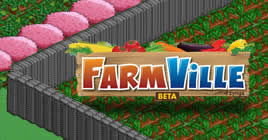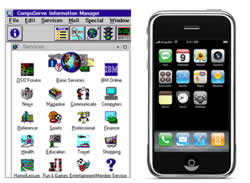 Is Zynga’s break with Facebook a sign that software developers, feeling trapped by the platforms on which they grew, want to down the garden wall?
Is Zynga’s break with Facebook a sign that software developers, feeling trapped by the platforms on which they grew, want to down the garden wall?
The biggest app maker on Facebook may want to break up with the social network site. Flash and Apple have divorced, citing irreconcilable differences. We’re moving past the days of net neutrality, into those of app neutrality. Are the garden walls of social networks and mobile devices ready to crumble, just as rigidly controlled online services gave way to the Web fifteen years ago?
Once upon a time, if you wanted to connect with others through a computer you probably had a Compuserve or an AOL account. Sure, a few nerds had downloaded Trumpet Winsock for their Windows 3.1 machines, installing a new-fangled software called Mosaic that let them “browse” — but that was for die-hard geeks.
 AOL and Compuserve were simple, controlled environments. They were safe for children, and they grouped content into useful chunks according to what editors and developers thought was right. In other words, they were just like the iPhone and the App Store.
AOL and Compuserve were simple, controlled environments. They were safe for children, and they grouped content into useful chunks according to what editors and developers thought was right. In other words, they were just like the iPhone and the App Store.
We all know the history here: the “walled gardens” of AOL and Compuserve gave way to the wild, untamed Web. To be sure, variety helped. Commerce was free and open. Porn abounded, and we filled our links with the glory of Blink tags, NSFW, and portals.
Today, we take that web for granted. It’s easier to use, searchable, and familiar. There’s no need for garden walls on the Web.
But there’s a new class of walled gardens, within platforms themselves. The iPhone/iPad is one example — no Flash, because Steve said so, even though it breaks half the websites in the world and blocks streaming TV. Facebook is another, with those who use the platform limited in how they message users and paying tithes to Facebook.
In the early days of technology, walled gardens make the world safe for new users. Both Facebook and the iPhone have appealed to a broader audience, just as AOL and Compuserve prepared a generation for the Web. Indeed, the iPhone’s screen resembles nothing as much as Compuserve’s online service.
The Internet’s dominant platforms are caught in a tug of war between closed, usable, safe platforms and open, creative, and potentially offensive content. This is a political debate: Conservatives versus progressives, safe versus exhilarating. There are signs that open will win — the Android platform has outstripped Apple’s iPhone for the first time, and it has an open app store and will support Flash.
Unfortunately, it’s not a topic that gets much discussion. That’s bad, because it will govern everything from freedom of speech to innovation in the coming decades. Hopefully, Mr. Zuckerberg and Mr. Jobs will tear down these walls.






 @
@ Tags:
Tags: 


 Like all images on the site, the topic icons are based on images used under Creative Commons or in the public domain. Originals can be found from the following links. Thanks to
Like all images on the site, the topic icons are based on images used under Creative Commons or in the public domain. Originals can be found from the following links. Thanks to